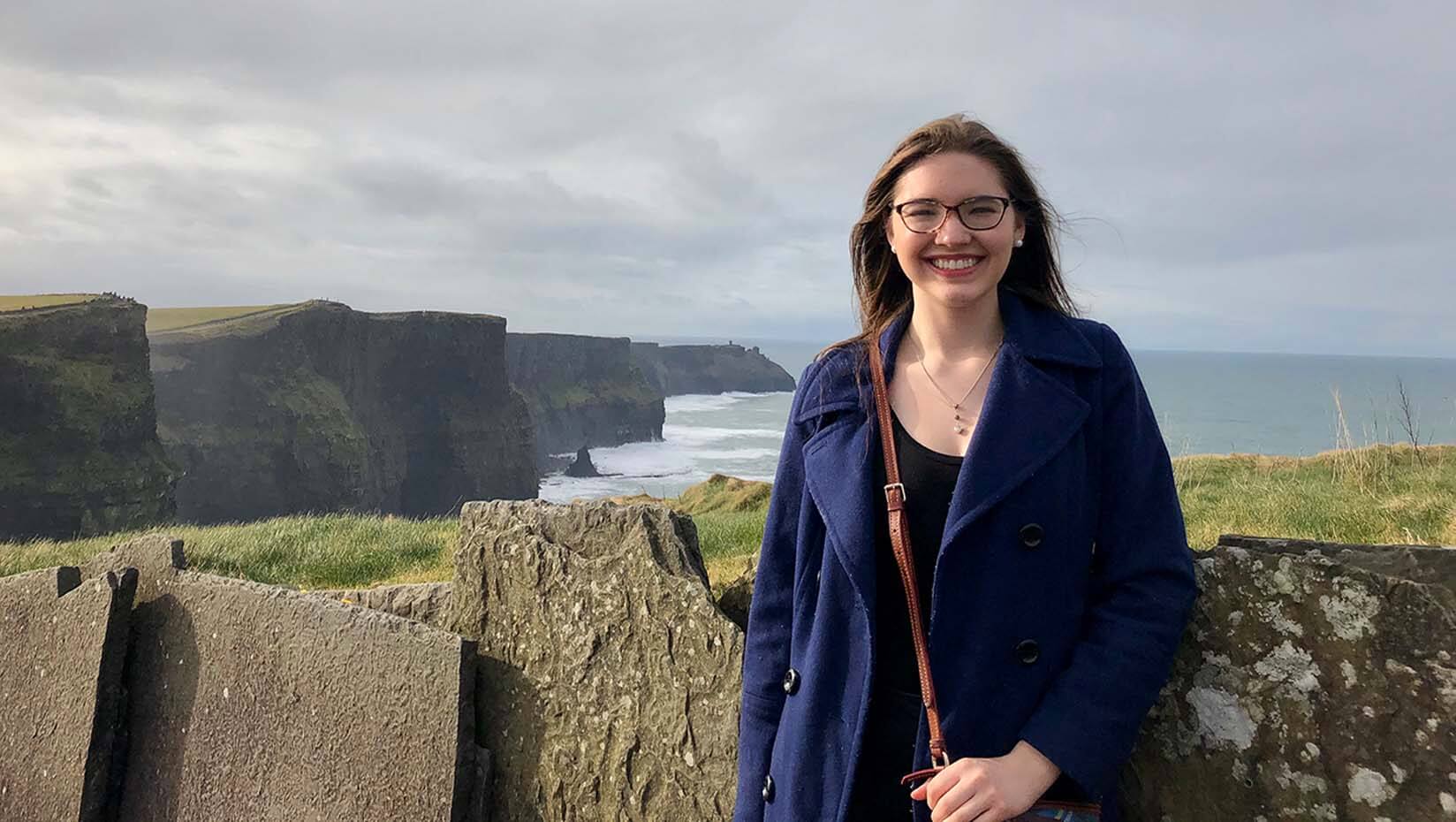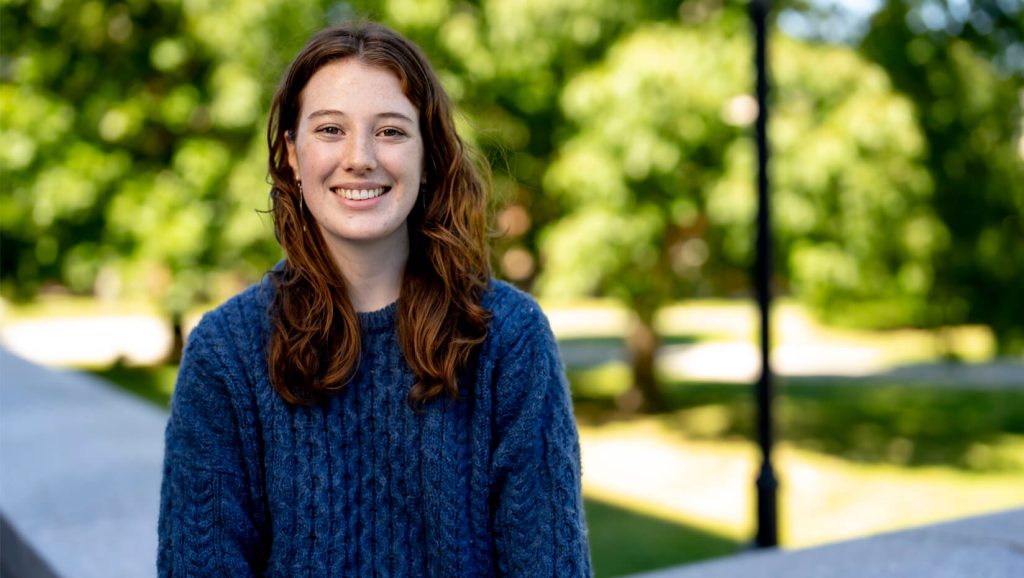
George Mitchell Peace Scholarship celebrates 25th anniversary

During the 2024-2025 academic year, the George J. Mitchell Peace Scholarship, a prestigious exchange program between the University of Maine and the University College Cork (UCC) in Ireland, will celebrate its 25th anniversary. The legacy of the scholarship has been meaningful for UMaine students and faculty alike.
The scholarship honors the Northern Ireland peace agreement brokered by former U.S. Sen. George Mitchell between the governments and peoples of Ireland and the United Kingdom. The agreement was reached on Good Friday, April 10, 1998, and accepted by vote of the citizens of Ireland and Northern Ireland on May 22, 1998.
“Preserving peace and hope for a brighter future requires investing in the education of tomorrow’s leaders. I’m pleased that for 25 years, this scholarship has allowed University of Maine students to not only enhance their talents at the world-renown University College Cork, but also immerse themselves in the history and culture of the people of Ireland — north and south — and their leaders,” Mitchell said. “I’m confident the long-lasting relationship between UMaine, our state, the University College Cork and the people of Ireland will continue enriching the lives of many people for years to come.”
Orlina Boteva, director of international programs at UMaine, said that the scholarship’s historic significance is unique.
“It may appear like one of our regular exchange programs, but actually, it was developed at a very high level between the Maine state government and the government of Ireland,” Boteva said. “Twenty-five years is a milestone. There are very few international education relationships that were established based on such an important historic event in terms of Irish history, but also by an important Maine politician and in recognition of his public service.”
The Peace Scholarship is an agreement between Maine and Ireland for a student exchange at the university level. UCC stepped up to the plate for the exchange.
The first Peace Scholarship exchanges took place during the 1999-2000 academic year. Marita Foster, the director of education abroad at UCC, said that originally, their college was meant to be the representative Irish university for a limited period of time and other Irish universities would then “get their bite of the cherry, so to speak.”
“However, the warm relationship that developed between UCC and the University of Maine System and the enthusiasm of the students at the respective institutions to participate in the scholarship [program] led to a decision that there would be no changes to the initial arrangement,” Foster said. “Long-term friendships have been established between students as well as between staff and the scholarship has certainly achieved its goal of contributing to positive relations between the state of Maine and Ireland and between Maine and Cork.”
What the scholarship means for UMaine
Boteva said that the scholarship is also unique in its breadth. The academic options at the UCC are similar to UMaine’s, so majors that would normally be challenging to place in a study abroad program, like biology, biochemistry and forestry, are able to apply for the opportunity. The scholarship covers the tuition and fees, housing and meals for a full semester as well as the airfare to Ireland, so it provides opportunities for students who might not otherwise be able to afford to study abroad.
The scholarship is fairly competitive, and the application is robust, including two letters of recommendations, a personal essay and a demonstrated commitment to public service.
“Students have to have some volunteer community engagement to be seriously considered for it. They need to demonstrate how they have contributed to their local community and how they will contribute while in Ireland and what they will bring back to UMaine,” Boteva said.
The applicants are reviewed by a committee of UMaine faculty and staff, who also share that the experience is a fruitful one for them. Julia Van Steenberghe, director of student success and recruitment at the Maine Business School, said that she was “so excited” when Erika Clement, assistant director of education abroad, approached her to be on the search committee.
“I loved learning about the history of the scholarship through the prep work and even more so from the applicants,” Steenberghe said. “This is an amazing opportunity for UMaine students and the UMaine community. I wish more scholarships like this existed.”
Student stories

The 25th annual scholarship recipient is Ruth Griffith, a rising junior from Parkman, Maine studying economics. She said she was not aware of the historic milestone until she received the scholarship.
“It’s amazing that it’s gone on for 25 years. I can’t imagine how different things might have been if students didn’t have that opportunity,” Griffith said.
Griffith has yet to have her UCC experience — she will go abroad in spring 2025 — but students who have received the scholarship in the past are profoundly impacted by the experience.

Adam Fortier-Brown, a UMaine alumnus who now works as a legal intern and is pursuing a degree at University of Maine Law, said that receiving the George Mitchell Peace Scholarship in 2017 was more than just an academic experience — it was a hugely transformative period of growth and discovery.
“Studying in Cork, Ireland, gave me a new appreciation for different perspectives and the importance of global understanding, which is so crucial in today’s interconnected world,” Fortier-Brown said. “This scholarship, along with its financial support, is an investment in the potential of University of Maine System students to become leaders who can bridge cultures and drive meaningful change. The lessons I learned during my time as a Peace Scholar continue to shape how I approach challenges and opportunities in both my professional and personal life.”
Bailey West, 2021 valedictorian and now a Ph.D. candidate in pathobiology at Johns Hopkins University School of Medicine, was the George Mitchell Peace Scholarship recipient for the spring 2020 semester. She said that during her time at UCC gave her the unique opportunity to study the Irish language, Celtic history and rural European economics, and connect with her Irish heritage; she had ancestors who immigrated to the U.S. during the Irish potato famine in the mid-1800s.
“This experience helped me better appreciate my position as a global citizen and my Irish roots,” West said. “During the international student orientation, the orientation leader said, ‘Stand up if you are an immigrant.’ When only a few students rose, she said, ‘You should all stand; you are all immigrants.’ This shifted my perspective because my experience with the immigration process was under the absolute best of circumstances, and even then it dramatically stretched my comfort zone.”
West’s time was cut short by the COVID-19 pandemic, but she said the impact on her was still profound, and she hopes to one day return to Ireland to finish visiting the places on her list.
“At first, I wasn’t sure if studying abroad could be a reality for me, but this incredibly generous scholarship made it possible,” West said. “Applying was one of the best decisions I made, and I am thankful I took that chance. The Office of International Programs and the Office of Major Scholarships were instrumental in helping me prepare my application, and I would encourage any student to make the most of these valuable resources. The George Mitchell Peace Scholarship is truly a transformative opportunity.”
Ben Hale was one of the earliest Peace Scholars, who spent a semester in 2003 at UCC.
“My experience at University College Cork was amazing,” Hale said. “I was in a program focused on learning about Irish Politics. Probably the best academic experience was a trip to Belfast, where we learned directly from people involved in ending the Troubles and we were able to meet with MPs at Stormont, Northern Ireland’s parliament building. I also loved joining their Mountaineering Club. Hiking in Ireland was awesome and quite a different experience from hiking here in Maine.”
The experience also made Hale feel comfortable living abroad; after graduating, he taught English in Incheon, South Korea for two years before returning to UMaine for his master’s degree in teaching. He now teaches at John Bapst High School in Bangor.
Even two decades later, Hale’s experience as a Peace Scholar informs his work as a teacher.
“I now teach high school social sciences where I often use examples from my time in Ireland in the classroom,” Hale said. “Anyone looking to study abroad should definitely apply for the George J. Mitchell Peace Scholarship. You won’t regret it.”
Story by Sam Schipani.
Contact: Marcus Wolf, 207.581.3721; marcus.wolf@maine.edu
